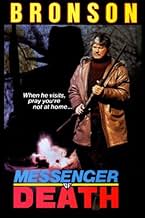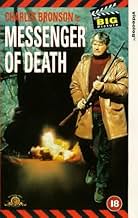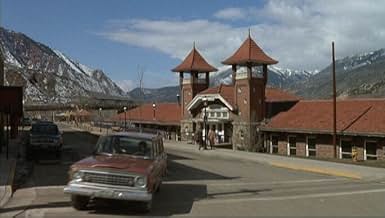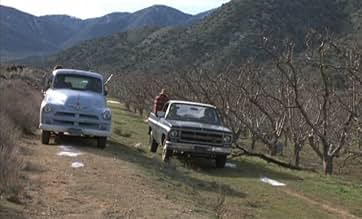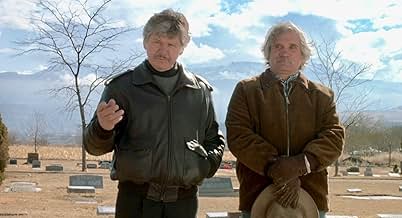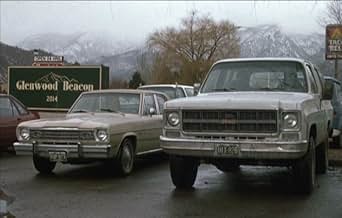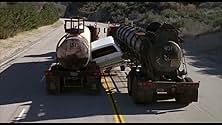VALUTAZIONE IMDb
5,4/10
3718
LA TUA VALUTAZIONE
Aggiungi una trama nella tua linguaA Denver reporter investigates the mass murder of a family of Mormons in rural Colorado.A Denver reporter investigates the mass murder of a family of Mormons in rural Colorado.A Denver reporter investigates the mass murder of a family of Mormons in rural Colorado.
- Regia
- Sceneggiatura
- Star
Recensioni in evidenza
Wifes and children of the Mormon Orville Beecham (Charles Dierkop) become victims of a slaughter in his own house . The police believes the massacre had a religious motive . Orville doesn't give any comment on the investigation and he is taken into protective custody . Tough 'Denver Tribune' crime reporter Garret Smith (Bronson , he was about sixty-six years of age when he appeared here) persuades him to help him in the case of the slaying of his family . As there is an extreme feud between different Mormon sects , one being led by Willis Beecham (Jeff Corey) and the other led by his brother Zenas Beecham (John Ireland) . Smith , helped by Jastra Watson (Trish Van Devere) , uncovers a strange conspiracy around old-rich real state .
This light entertainment and standard Bronson movie is full of action , thrills , and disturbing scenes . Here Bronson rules in his usual stoic acting and displays efficiently his weapons , killing mercilessly nasties . The meaning and relevance of this movie's title is that it refers to a drawing featuring an avenging angel of death that is left at a crime scene at the beginning of the flick . The title also suggests that Bronson is a 'Messenger of Death', the word messenger also being a play on words with this, as his character is a reporter , a job which involves writing news articles , they being "messages" in a sense . In the film there is frantic action , thrilling car/trucks pursuits , shootouts , intrigue , little bit of violence and including a twisted as well as suspenseful finale . Based on a book and scripted by Paul Jarrico , as its source Rex Burns novel 'The Avenging Angel' was first published in 1983 , though the film has little in common with the novel it is based on . From the beginning until ending the action-packed and fast moving is continued and that's why the picture results to be entertaining . This is one of the last films (last movie was Kinjite) Charles Bronson made for Cannon Films and it represents the ninth and final of ten teamings between producer Pancho Kohner and star actor Bronson . Charles Bronson acting is wooden as being habitual in his roles as an investigator/executioner . Here he plays a reporter who carries out an investigation and finds out about economic motives for a massacre . This journalist evokes the crime writer character he played in St. Ives (1976) , the first movie he made with Thompson . The great spotlights of the film are the spectacular chases , car crashes between Bronson's car and the big juggernaut as well as the ending confrontation that's stimulating and moving . Nice and wide support cast , such as : Daniel Benzali , Marilyn Hasset , John Cedar , Penny Peyser , Tom Everett and Gene Davis who starred a heinous killer in ¨10 to midnight¨ by Thompson . Special mention for Laurence Luckinbill who gives an overacting with quite gesticulation . And the elders of this movie's religious groups are played by three stars of old Western movies : Charles Dierkop , Jeff Corey and John Ireland . It packs and evocative and adequate cinematography by Gideon Porath . Atmospheric soundtrack by Robert O. Ragland , including stirring choral score in the title and final credits composed in ¨Jerry Goldsmith's Omen¨ style .
The fare was regularly directed by J. Lee Thompson , though he fell ill during the making of this film , the picture was then finished by the first and 2nd unit director : Robert C. Ortwin Jr. and George Van Noy . It's narrated understanding as well as hardly . This movie represented the eighth and penultimate of nine teaming of director 'J Lee Thompson' with star actor Charles Bronson . This Thompson movie was theatrically released between his pictures Death Wish 4: The Crackdown (1986) and Kinjite (1989) , both of them starred by Bronson . Thompson previously had a nice track record in the English cinema from 1950 until 1961 , directing good Western (McKenna's gold , White Buffalo) and all king genres as Sci-Fi (Conquest and Battle of planet of apes), terror (reincarnation of Peter Proud , Eye of the devil), adventures (Flame over India , Kings of the sun , Taras Bulba , Tiger Bay) and Warlike ( Guns of Navarone, Von Braun , Chairman , The passage). His two biggest successes turned out to be ¨Guns of Navarone¨and ¨Cape Fear¨. Thereafter , the filmmaker's career subsided in a morass of slickly realized but middling films. He moved into the field of international spectaculars , at which point his filmmaking seemed to lose its individuality . J. Lee Thomson working from the 50s in England, finished his career making Chuck Norris (Firewalker) and Charles Bronson vehicles (Caboblanco , Evil that men do, Messenger of death, Death Wish 4 : Crackdown, Caboblanco, St Ives). Firewalker rating : Mediocre but passable , but it will appeal to Charles Bronson fans
This light entertainment and standard Bronson movie is full of action , thrills , and disturbing scenes . Here Bronson rules in his usual stoic acting and displays efficiently his weapons , killing mercilessly nasties . The meaning and relevance of this movie's title is that it refers to a drawing featuring an avenging angel of death that is left at a crime scene at the beginning of the flick . The title also suggests that Bronson is a 'Messenger of Death', the word messenger also being a play on words with this, as his character is a reporter , a job which involves writing news articles , they being "messages" in a sense . In the film there is frantic action , thrilling car/trucks pursuits , shootouts , intrigue , little bit of violence and including a twisted as well as suspenseful finale . Based on a book and scripted by Paul Jarrico , as its source Rex Burns novel 'The Avenging Angel' was first published in 1983 , though the film has little in common with the novel it is based on . From the beginning until ending the action-packed and fast moving is continued and that's why the picture results to be entertaining . This is one of the last films (last movie was Kinjite) Charles Bronson made for Cannon Films and it represents the ninth and final of ten teamings between producer Pancho Kohner and star actor Bronson . Charles Bronson acting is wooden as being habitual in his roles as an investigator/executioner . Here he plays a reporter who carries out an investigation and finds out about economic motives for a massacre . This journalist evokes the crime writer character he played in St. Ives (1976) , the first movie he made with Thompson . The great spotlights of the film are the spectacular chases , car crashes between Bronson's car and the big juggernaut as well as the ending confrontation that's stimulating and moving . Nice and wide support cast , such as : Daniel Benzali , Marilyn Hasset , John Cedar , Penny Peyser , Tom Everett and Gene Davis who starred a heinous killer in ¨10 to midnight¨ by Thompson . Special mention for Laurence Luckinbill who gives an overacting with quite gesticulation . And the elders of this movie's religious groups are played by three stars of old Western movies : Charles Dierkop , Jeff Corey and John Ireland . It packs and evocative and adequate cinematography by Gideon Porath . Atmospheric soundtrack by Robert O. Ragland , including stirring choral score in the title and final credits composed in ¨Jerry Goldsmith's Omen¨ style .
The fare was regularly directed by J. Lee Thompson , though he fell ill during the making of this film , the picture was then finished by the first and 2nd unit director : Robert C. Ortwin Jr. and George Van Noy . It's narrated understanding as well as hardly . This movie represented the eighth and penultimate of nine teaming of director 'J Lee Thompson' with star actor Charles Bronson . This Thompson movie was theatrically released between his pictures Death Wish 4: The Crackdown (1986) and Kinjite (1989) , both of them starred by Bronson . Thompson previously had a nice track record in the English cinema from 1950 until 1961 , directing good Western (McKenna's gold , White Buffalo) and all king genres as Sci-Fi (Conquest and Battle of planet of apes), terror (reincarnation of Peter Proud , Eye of the devil), adventures (Flame over India , Kings of the sun , Taras Bulba , Tiger Bay) and Warlike ( Guns of Navarone, Von Braun , Chairman , The passage). His two biggest successes turned out to be ¨Guns of Navarone¨and ¨Cape Fear¨. Thereafter , the filmmaker's career subsided in a morass of slickly realized but middling films. He moved into the field of international spectaculars , at which point his filmmaking seemed to lose its individuality . J. Lee Thomson working from the 50s in England, finished his career making Chuck Norris (Firewalker) and Charles Bronson vehicles (Caboblanco , Evil that men do, Messenger of death, Death Wish 4 : Crackdown, Caboblanco, St Ives). Firewalker rating : Mediocre but passable , but it will appeal to Charles Bronson fans
Easily skip-able Charles Bronson movie that starts out strongly but doesn't follow through. He unconvincingly plays a Denver reporter covering a case of a Mormon family living in the Colorado mountains who had nine members massacred, including five children. He then sets out to find the killer by visiting the eccentric community and finds that much of the evidence leads to a family feud between two brothers, along with ties to a water company. Why Chuck's character would feel so personally bent on dealing out vengeance when it's not his own flesh and blood didn't ever strike me as authentic. J. Lee Thompson directs (as usual) and manages to serve up some pretty scenery along with a good cast including John Ireland and Jeff Corey, but this is rather weak tea. ** out of ****
A movie where Charles Bronson doesn't kill anyone. Despite the title. Despite the poster or the video cover. There are indeed deaths, in a Mormon family, where children and women are massacred (this is the beginning of the film). Charles Bronson is a journalist who investigates to understand why a family of Mormons has been decimated. He conducts the investigation on his own, at his own pace, independently of the police, supported by his newspaper, which wants to create a sensation.
The documentary side of the film presents us with the thought patterns of these Mormons, where God's will (which explains everything) and vengeance go hand in hand, in a country where guns are freely available. The messenger of death is the killer who decimated the family, unrelated to the character of Charles Bronson who investigates. Or, the journalist through his investigation, who will indirectly provoke reprisals between Mormon families.
Another interesting element of the film is the natural settings of Colorado. Let's add a superb music that can make us think of a horror movie: the composer, Robert O. Ragland is unknown to us, but has signed many film scores. This one is interesting, because it suits the suspense and horror.
The film ends with evil capitalists and politicians greedy for money.
The film can be watched without any problem. The scenes in the city (Denver, the capitalists, the important people) are the perfect counterpoint to the scenes in the countryside where Charles Bronson investigates and ends up putting the pieces of the puzzle together in the Mormon farms.
The documentary side of the film presents us with the thought patterns of these Mormons, where God's will (which explains everything) and vengeance go hand in hand, in a country where guns are freely available. The messenger of death is the killer who decimated the family, unrelated to the character of Charles Bronson who investigates. Or, the journalist through his investigation, who will indirectly provoke reprisals between Mormon families.
Another interesting element of the film is the natural settings of Colorado. Let's add a superb music that can make us think of a horror movie: the composer, Robert O. Ragland is unknown to us, but has signed many film scores. This one is interesting, because it suits the suspense and horror.
The film ends with evil capitalists and politicians greedy for money.
The film can be watched without any problem. The scenes in the city (Denver, the capitalists, the important people) are the perfect counterpoint to the scenes in the countryside where Charles Bronson investigates and ends up putting the pieces of the puzzle together in the Mormon farms.
Boy, this is a mess. This is one of those films that, on paper, look like they have a lot going for them but, when they put it on the screen, nothing meshes. There's a decent cast Bronson, van Devere, Benzali, Ireland, Corey and an intriguing setting, but the plot is fatally anaemic and the direction, considering it comes from an old trooper like Thompson, is surprisingly shoddy. Much of the acting is second-rate at best, while characters perform abrupt about turns for no explicable reason. For instance, Orville Beecham (Charles Dierkop), a clean-living Mormon farmer, is crazy for revenge after mysterious intruders murder his wives and children and yet is full of forgiveness after the rest of his family is wiped out in a gunfight.
The film opens well, with an atmospheric prologue in which two mysterious gunmen massacre the wives and children, although why the gunmen's identities are concealed is something of a mystery as they disappear for the next thirty minutes and are immediately confirmed as the killers when they re-appear. Anyway, from this neatly paced opener, the film goes rapidly downhill. Charles Bronson plays a Denver reporter who gets involved with the warring Mormon clans who go to war over the killings, and he's pretty bad here. He was 67 when the film was made, and he looks bloated and tired. On top of that, he's saddled with an awful script and a frankly ludicrous storyline which is a crime really because the unusual subject matter here deserves much better writing than that offered by 73-year-old writer Paul Jarrico. Director J. Lee Thompson manages a couple of effective scenes, and there is a good sequence in which two water tankers attempt to crush Bronson's vehicle on a winding country road, but for the most part his direction is flat and uninspired and the story simply fails to engage.
Bottom line: give this one a miss.
The film opens well, with an atmospheric prologue in which two mysterious gunmen massacre the wives and children, although why the gunmen's identities are concealed is something of a mystery as they disappear for the next thirty minutes and are immediately confirmed as the killers when they re-appear. Anyway, from this neatly paced opener, the film goes rapidly downhill. Charles Bronson plays a Denver reporter who gets involved with the warring Mormon clans who go to war over the killings, and he's pretty bad here. He was 67 when the film was made, and he looks bloated and tired. On top of that, he's saddled with an awful script and a frankly ludicrous storyline which is a crime really because the unusual subject matter here deserves much better writing than that offered by 73-year-old writer Paul Jarrico. Director J. Lee Thompson manages a couple of effective scenes, and there is a good sequence in which two water tankers attempt to crush Bronson's vehicle on a winding country road, but for the most part his direction is flat and uninspired and the story simply fails to engage.
Bottom line: give this one a miss.
Charles Bronson plays investigative reporter Garret Smith for the Denver Tribune in this motion picture about a blood feud between two brothers, of different Mormon sects. With outside political as well as economic overtones.
A decent story about religious jealousy and the behind the scenes politics of exploiting it. The feud between brothers Willis, Jeff Corey, and Zenas, John Ireland, Beecham is instigated when Willis' son's Orville's, Charles Dierkop, family is massacred. Willis believes that it was the work of Zenas and starts an all out war against his brother which ends with both brothers getting killed. But there's something else that has nothing to do with the feud between the brother's that's central to the story: A lake of artesian water under brother's Zenas' property that can be used to turn common and plentiful shale into valuable and scarce fuel oil.
Charles Bronson is still believable, at age 67, as the tough reporter that gets to the bottom of the story with his fists as well as his typewriter to uncover the truth about Orville's family being murdered. As well as who ordered it that instigated a war between his father and uncle and why.
With the exception of the beginning the movie "Messenger of Death" cuts down on the violence and concentrated more on the story which made the movie more interesting to watch. And also gave the audience more time to think who's behind the murders that happened to the Orville Beecham family which built up to a better then average ending.
The ending of "Messenger of Death" though a bit contrived and what seemed forced still tied the story together and made it believable. One of Charles Bronson's best later efforts when he was still effective as an action hero, or in this case an action reporter, on the screen.
A decent story about religious jealousy and the behind the scenes politics of exploiting it. The feud between brothers Willis, Jeff Corey, and Zenas, John Ireland, Beecham is instigated when Willis' son's Orville's, Charles Dierkop, family is massacred. Willis believes that it was the work of Zenas and starts an all out war against his brother which ends with both brothers getting killed. But there's something else that has nothing to do with the feud between the brother's that's central to the story: A lake of artesian water under brother's Zenas' property that can be used to turn common and plentiful shale into valuable and scarce fuel oil.
Charles Bronson is still believable, at age 67, as the tough reporter that gets to the bottom of the story with his fists as well as his typewriter to uncover the truth about Orville's family being murdered. As well as who ordered it that instigated a war between his father and uncle and why.
With the exception of the beginning the movie "Messenger of Death" cuts down on the violence and concentrated more on the story which made the movie more interesting to watch. And also gave the audience more time to think who's behind the murders that happened to the Orville Beecham family which built up to a better then average ending.
The ending of "Messenger of Death" though a bit contrived and what seemed forced still tied the story together and made it believable. One of Charles Bronson's best later efforts when he was still effective as an action hero, or in this case an action reporter, on the screen.
Lo sapevi?
- QuizDirector J. Lee Thompson fell ill during the making of this film, the picture was finished by second unit director, Robert C. Ortwin Jr..
- BlooperDuring the car chase, Smith's car is on the inside of one of the tankers on the first corner out of the tunnel, but in the next shot it's back in the middle of both tankers.
- Citazioni
Garret Smith: [punching the assassin] Bastard child killer!
- Versioni alternativeAlmost 5 minutes were cut in Finland for VHS distribution. Later released on DVD as uncut.
- ConnessioniReferenced in DVD/Lazerdisc/VHS collection 2016 (2016)
I più visti
Accedi per valutare e creare un elenco di titoli salvati per ottenere consigli personalizzati
- How long is Messenger of Death?Powered by Alexa
Dettagli
Botteghino
- Lordo Stati Uniti e Canada
- 3.074.681 USD
- Fine settimana di apertura Stati Uniti e Canada
- 1.035.279 USD
- 18 set 1988
- Lordo in tutto il mondo
- 3.074.681 USD
- Tempo di esecuzione
- 1h 31min(91 min)
- Colore
- Mix di suoni
- Proporzioni
- 1.85 : 1
Contribuisci a questa pagina
Suggerisci una modifica o aggiungi i contenuti mancanti


